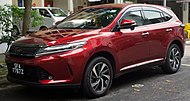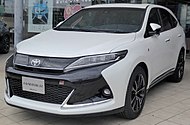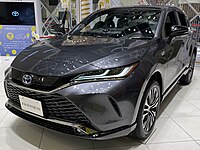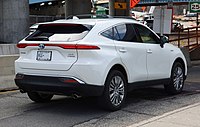Toyota Harrier
This article needs additional citations for verification. (October 2019) |
| Toyota Harrier | |
|---|---|
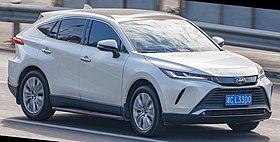 FAW Toyota Harrier (XU80, China) | |
| Overview | |
| Manufacturer | Toyota |
| Also called |
|
| Production | December 1997 – present |
| Body and chassis | |
| Class |
|
| Body style | 5-door SUV |
| Layout | |
The Toyota Harrier (Japanese: トヨタ・ハリアー, Hepburn: Toyota Hariā) is a five-passenger compact, later mid-size crossover SUV produced by Toyota since December 1997 in Japan, which was once exclusive to Toyopet Store Japanese dealerships. In export markets, the Harrier was rebadged as the Lexus RX from March 1998 to December 2008. At this stage, Toyota had yet to retail the Lexus brand to its Japanese customers.
The second generation (XU30) debuted in February 2003, along with the export Lexus version. The third-generation RX (separated from the Harrier) arrived in late 2008, while the Harrier continued on in second-generation form unchanged (although the second generation Harrier 350G, equivalent to second generation RX350, was discontinued after the release of third generation Lexus RX). Lexus had by now made its debut in Japan as an independent marque, thus the third-generation RX was sold in the domestic market in the same livery as its export counterpart.
The third generation (XU60) debuted in 2013, when it morphed into an independent model line constructed on a separate platform from the RX (the Harrier since then built on the same platform as the RAV4) but retaining a visual link with it. Starting at this point, it is considered as a more road-oriented and upmarket alternative to the RAV4, comparable to the luxury-class Lexus NX. From the fourth generation (XU80), it is also sold as the second-generation Venza in North America and China.
The Harrier is named for the eastern marsh harrier, a bird of prey common to Hokkaidō and northern Honshū called the chūhi in Japanese, and an emblem depicting the bird in stylized profile can be found on the grille until the XU60 model.
Lexus RX-paralleled models
-
First generation (XU10; 1997)
-
Second generation (XU30; 2003)
Third generation (XU60; 2013)
| Third generation | |
|---|---|
 2015 Toyota Harrier Premium FWD (ZSU60) | |
| Overview | |
| Model code | XU60 |
| Production | November 2013 – May 2020 |
| Assembly | Japan: Toyota City, Aichi (Takaoka plant)[2] |
| Body and chassis | |
| Platform | Toyota New MC platform |
| Related | |
| Powertrain | |
| Engine | |
| Electric motor |
|
| Power output |
|
| Transmission |
|
| Hybrid drivetrain | Power-split (hybrid) |
| Dimensions | |
| Wheelbase | 2,660 mm (104.7 in) |
| Length | 4,720–4,770 mm (185.8–187.8 in) |
| Width | 1,835 mm (72.2 in) |
| Height | 1,690 mm (66.5 in) |
| Kerb weight | 1,560–1,810 kg (3,439–3,990 lb) |
| Chronology | |
| Predecessor | |
Released on 2 December 2013 in Japan for the petrol model and 15 January 2014 for the hybrid model, the XU60 series Harrier replaced not only its XU30 series namesake, but also the XA30 series Vanguard. Unlike the second and third-generation RX, which is built on the K platform, the XU60 series Harrier derived from the XA40 series RAV4's New MC underpinnings.[3]
Trim levels available in Japan include Grand, Elegance, and Premium for both the petrol and hybrid models. The top-of-the-line Premium trim came with JBL GreenEdge audio with 8-inch T-Connect touchscreen entertainment system with navigation and sensing features. A "Style Mauve" special edition and subsequently the "Style Ash" special edition was released later.
The XU60 series Harrier received a facelift on 8 June 2017. For the facelift model, the Grand trim was removed and Elegance became the base trim. The Progress trim replaced Premium as the flagship trim, with the "Metal and Leather Package" added to both Premium and Progress trims. The "Style NOIR" special edition for naturally-aspirated Premium trim were also added later. A Turbo model was introduced with a 2.0-litre turbocharged 8AR-FTS engine mated to a 6-speed U661 automatic transmission, while the 2.0-litre naturally-aspirated 3ZR-FAE and 2.5-litre 2AR-FXE hybrid engines remained.
Toyota Safety Sense P safety system (adaptive cruise control, lane departure assist, pre-collision system and automatic high beam) were standard across the trim levels.
The XU60 series Harrier was the first Harrier to be officially sold outside of Japan. It was offered in Singapore and Malaysia. In Malaysia, it was introduced in November 2017 with two trim levels offered: Premium and Luxury. Both trim levels are powered by a 2.0-litre 8AR-FTS engine.[4]
Engines
| Chassis code | Engine | Transmission | Power | Torque | Year of availability | |
|---|---|---|---|---|---|---|
| Petrol engines | ||||||
| ZSU60 (FWD) ZSU65 (4WD) |
1,986 cc 3ZR-FAE DOHC 16-valve EFI straight-four with Dual VVT-i and Valvematic | Super CVT-i with 7-speed simulation | 111 kW (149 hp; 151 PS) at 6,100 rpm | 193 N⋅m (142 lb⋅ft) at 3,800 rpm | 2013–2020 | |
| ASU60 (FWD) ASU65 (4WD) |
1,998 cc 8AR-FTS DOHC 16-valve EFI turbocharged straight-four with VVT-iW and D-4ST | 6-speed U661 automatic | 170 kW (228 hp; 231 PS) at 5,200–5,600 rpm | 350 N⋅m (260 lb⋅ft) at 1,650–4,000 rpm | 2017–2020 | |
| Hybrid engines | ||||||
| AVU65 (4WD) | 2,493 cc 2AR-FXE DOHC 16-valve EFI straight-four with VVT-iE | eCVT | 112 kW (150 hp; 152 PS) at 5,700 rpm | 206 N⋅m (152 lb⋅ft) at 4,400–4,800 rpm | 2013–2020 | |
Gallery
-
Harrier (pre-facelift)
-
2017 Harrier Turbo (facelift)
-
2017 Harrier Turbo (facelift)
-
2018 Harrier Turbo Elegance GR Sport (ASU60W)
-
2017 Harrier Elegance GR Sport (ZSU60W)
-
Interior (pre-facelift)
Fourth generation (XU80; 2020)
| Fourth generation | |
|---|---|
 2020 Harrier G 4WD (MXUA85) | |
| Overview | |
| Model code | XU80 |
| Also called | Toyota Venza (North America; China, GAC Toyota) |
| Production | June 2020 – present |
| Model years | 2021–2024 (US) |
| Assembly |
|
| Designer | Nobuhiko Honda, Pansoo Kwon, Hideo Koyama and Daisuke Iguchi[5] |
| Body and chassis | |
| Platform | TNGA: GA-K[6][7] |
| Related | |
| Powertrain | |
| Engine | |
| Electric motor |
|
| Power output |
|
| Transmission | |
| Hybrid drivetrain | Power-split |
| Battery |
|
| Dimensions | |
| Wheelbase | 2,690 mm (105.9 in) |
| Length | 4,740 mm (186.6 in) |
| Width | 1,855 mm (73.0 in) |
| Height | 1,660 mm (65.4 in) |
| Kerb weight | 1,620–1,770 kg (3,571–3,902 lb) |
| Chronology | |
| Successor | Toyota Crown Signia (North America) |
The XU80 series Harrier was announced on 13 April 2020 and went on sale on 17 June 2020.[6][7] It is built on the same GA-K platform as the XA50 series RAV4. Compared with the outgoing model, the width and the wheelbase is up by 20 mm (0.8 in) and 30 mm (1.2 in) respectively, while the height has been cut by 30 mm (1.2 in). Unlike the previous model, the turbocharged engine option is not available in this generation. It is available in S, G and Z grade levels in Japan. The Leather Package is also available in G and Z grades.
In September 2022, the plug-in hybrid version was released in Japan in a sole Z grade level. It shares the same system with the RAV4 PHEV.[8]
In other Asian markets, the fourth-generation Harrier was launched in Singapore on 29 January 2021.[9] It is offered in Elegance trim with a regular petrol engine, and Premium and Luxury trims with a hybrid engine. It was also launched in Malaysia on 8 April 2021, offered in a single Luxury trim paired with the 2.0-litre M20A-FKS engine and CVT.[10] It is also offered in China under both Harrier and Venza nameplates.[11]
-
2020 Harrier Hybrid Z (AXUH80)
-
Interior
-
Toyota Harrier Plug-in Hybrid Z (AXUP85)
-
Toyota Harrier Plug-in Hybrid Z (AXUP85)
Venza
The Harrier was unveiled in North America as the second-generation Venza on 18 May 2020.[12] The Venza for this market is only available in a four-wheel drive hybrid powertrain. It went on sale in September 2020.[13] Unlike the Harrier, it lacks the grille-mounted fog lamps on all trims. The second-generation Venza for North American market is built alongside the Harrier in Japan at the Takaoka plant, as opposed to the first-generation model which was built in the United States at Toyota Motor Manufacturing Kentucky.[14][15] It is offered in LE, XLE and Limited trims.
The Venza is also sold in China by GAC Toyota and produced at the Guangzhou factory. The front fascia differs from the Harrier that is also sold there by FAW Toyota, being produced at the Tianjin factory, making China the only country that offers both the Venza and Harrier models.[11]
-
2021 Venza XLE (AXUH85)
-
2021 Venza XLE (AXUH85)
-
 Chinese-market Venza
Chinese-market Venza
Engines
| Chassis code | Engine | Transmission | Power | Torque | Year of availability | |
|---|---|---|---|---|---|---|
| Petrol engines | ||||||
| MXUA80 (FWD) MXUA85 (4WD) |
1,986 cc M20A-FKS/M20D-FKS DOHC 16-valve EFI straight-four with Dual VVT-iE and D-4S | Direct Shift-CVT | 126 kW (169 hp; 171 PS) at 6,600 rpm | 207 N⋅m (153 lb⋅ft) at 4,800 rpm | 2020–present | |
| Hybrid engines | ||||||
| AXUH80 (FWD) AXUH85 (4WD) |
2,487 cc A25A-FXS DOHC 16-valve EFI straight-four with Dual VVT-iE and D-4S | eCVT | 131 kW (176 hp; 178 PS) at 5,700 rpm | 221 N⋅m (163 lb⋅ft) at 3,600–5,200 rpm | 2020–present | |
Sales
| Year | Japan[16][17] | Malaysia[18][i] |
|---|---|---|
| 1998 | 49,954 | |
| 1999 | 34,087 | |
| 2000 | 863 | |
| 2001 | 17,198 | 1,615 |
| 2002 | 9,520 | 2,657 |
| 2003 | 28,686 | 3,320 |
| 2004 | 26,222 | 3,395 |
| 2005 | 25,525 | 2,656 |
| 2006 | 28,040 | 1,650 |
| 2007 | 33,923 | 2,361 |
| 2008 | 26,920 | 2,283 |
| 2009 | 14,375 | 1,945 |
| 2010 | 11,239 | 2,326 |
| 2011 | 8,117 | 1,820 |
| 2012 | 5,790 | 1,591 |
| 2013 | 1,937 | 1,298 |
| 2014 | 64,920 | 941 |
| 2015 | 58,991 | 1,801 |
| 2016 | 41,403 | 2,102 |
| 2017 | 58,732 | 1,435 |
| 2018 | 44,952 | 2,647 |
| 2019 | 36,249 | 2,593 |
| 2020 | 66,067 | 1,983 |
| 2021 | 74,575 | 2,573 |
| 2022 | 34,182 | 4,014 |
- ^ Figures based on registration, includes grey imports and used car imports
References
- ^ Capparella, Joey (18 May 2020). "Toyota Venza Returns for 2021 as Two-Row Hybrid-Only SUV". CarandDriver.com. US: Car and Driver. Retrieved 19 May 2020.
- ^ "Japanese Production Sites". Toyota. 6 March 2015. Archived from the original on 18 March 2015.
- ^ "Redesigned Toyota 'Harrier' Crossover SUV to Launch in Japan" (Press release). Toyota City, Aichi: Toyota Global Newsroom. 13 November 2013. Archived from the original on 15 September 2019. Retrieved 21 October 2019.
- ^ Lee, Jonathan (9 November 2017). "2018 Toyota Harrier Malaysia prices announced – 2.0T Premium at RM238,000, 2.0T Luxury at RM259,900". Paultan.org. Malaysia: Driven Communications. Retrieved 21 October 2019.
- ^ US D938309, Honda, Nobuhiko; Kwon, Pansoo & Koyama, Hideo et al., "Motor vehicle and/or toy replica thereof", published 2021-12-14, assigned to Toyota Motor Co. Ltd.
- ^ a b "Toyota to Unveil New Model Harrier in Japan" (Press release). Toyota City, Aichi: Toyota Global Newsroom. 13 April 2020. Retrieved 13 April 2020.
- ^ a b Chan, Mick (13 April 2020). "All-new 2020 Toyota Harrier debuts – TNGA (GA-K) platform, 2.0L petrol, Direct Shift-CVT, no more turbo". Paultan.org. Malaysia: Driven Communications. Retrieved 13 April 2020.
- ^ "ハリアー、プラグインハイブリッドシステム搭載車を新設定 | トヨタ | グローバルニュースルーム" [Harrier, new setting of plug-in hybrid system equipped car]. トヨタ自動車株式会社 公式企業サイト (in Japanese). 26 September 2022. Retrieved 26 September 2022.
- ^ "All-new Toyota Harrier with panoramic roof launches at $161k". AsiaOne. 29 January 2021. Retrieved 10 June 2021.
- ^ Lee, Jonathan (8 April 2021). "2021 Toyota Harrier launched in Malaysia – TNGA platform, single 2.0L NA CVT variant, RM249,707". Paultan.org. Malaysia: Driver Communications. Retrieved 10 April 2021.
- ^ a b Lodhi, Abdullah (14 September 2021). "New Toyota Venza exposed with lots of Lexus ingredients". Car News China. Retrieved 2 October 2021.
- ^ Evans, Brett (18 May 2020). "2021 Toyota Venza: The Midsize Crossover Is Back, And It's A Hybrid". Motor1.com. US: Motor1. Retrieved 20 May 2020.
- ^ "Elevated Driving Experience Comes Standard in the All-New 2021 Venza" (Press release). US: Toyota. 22 July 2020. Retrieved 3 August 2020.
- ^ Goodwin, Antuan (18 May 2020). "2021 Toyota Venza reborn with standard hybrid power and all-wheel drive". CNET.com. US: CNET. Retrieved 20 May 2020.
- ^ Tan, Danny (19 May 2020). "2021 Toyota Venza – new fourth-gen Harrier goes to US". Paultan.org. Malaysia: Driven Communications. Retrieved 19 May 2020.
- ^ "トヨタ ハリアー 新車販売台数の推移/売れ行きと生産状況は? - クルマを買う!". kuru-ma.com. Retrieved 25 September 2022.
- ^ "トヨタ ハリアー 新車販売台数の推移/売れ行きと生産状況は? - クルマを買う!". kuru-ma.com. Retrieved 16 April 2023.
- ^ "Toyota Harrier : Popularity over the Years". data.gov.my.
External links
- Official website (Japan)
- Toyota vehicles
- Cars introduced in 1997
- 2000s cars
- 2010s cars
- 2020s cars
- Compact sport utility vehicles
- Mid-size sport utility vehicles
- Crossover sport utility vehicles
- Front-wheel-drive vehicles
- All-wheel-drive vehicles
- Hybrid sport utility vehicles
- Partial zero-emissions vehicles
- Vehicles with CVT transmission




